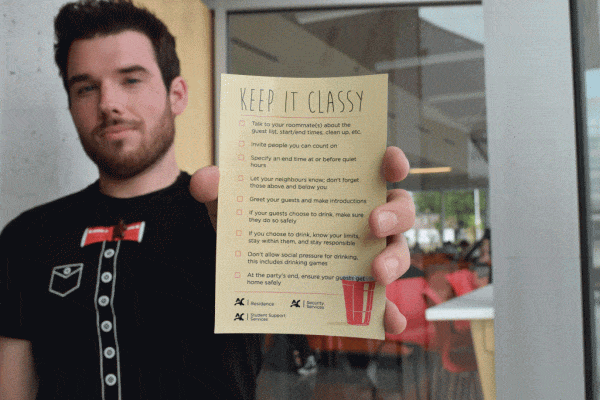By Miranda Abraham

Fridge magnets plastered on lockers in the first weeks back to class are asking Algonquin students to ‘Keep It Classy.’
The magnets provide a checklist for students to follow when throwing a party. It turns out that the magnets are a small part of a city-wide safe drinking campaign centered on the tag line and staff members at Algonquin are playing an important role in getting this campaign on its feet.
Sandra McCormick, manager of Health Services at Algonquin, has been working with the Safer Ottawa Drinking Alliance, or SODA, since its inception two years ago. SODA’s aim is to create awareness for safer drinking specifically among Ottawa students.
“We’re hoping that people will drink in moderation and not end up in the hospital and not hurt or dead” said McCormick.
SODA is comprised of 13 local organizations, including La Cité collégiale, University of Ottawa, and Algonquin. After a first attempt at capturing student’s attention through the school’s mascots proved ineffective, McCormick and the SODA team were in need of a fresh take.
Enter Steve Marchment, residence life coordinator at Algonquin. Marchment describes how the concept of the ‘Keep It Classy’ campaign was born out of a discussion with a friend at Thompson Rivers University. The two noticed how previous safe drinking campaigns tend to focus on the negative. Indeed it is not uncommon to see a safe drinking poster featuring a student passed out, or even dead, intended to shock the viewer into responsible behaviour.
While Marchment recognizes that negative campaigns may have worked, he believes it may also be time to “revisit how we’re trying to connect to the students.” For Marchment, it simply comes to down to a positive versus negative approach.
“We keep talking about what we don’t want students to do,” said Marchment. “So why don’t we create the definition of partying we want to see?”
McCormick agreed.
“We’re never saying ‘Don’t drink’,” she says. “We never say that.”
Both Marchment and McCormick are excited about the campaign, which they say will get into full swing in the coming months. The details about what exactly that entails are still under wraps for now and student reception and an assessment of the effectiveness of the campaign will also have to wait.
But Marchment is committed to reaching students whether or not this campaign is the one to do that successfully.
“We can think of all these great ideas, but in terms of what students actually want, I think that’s going to be the next piece. If it fails, it fails, and then we go back to square one and try again.”


